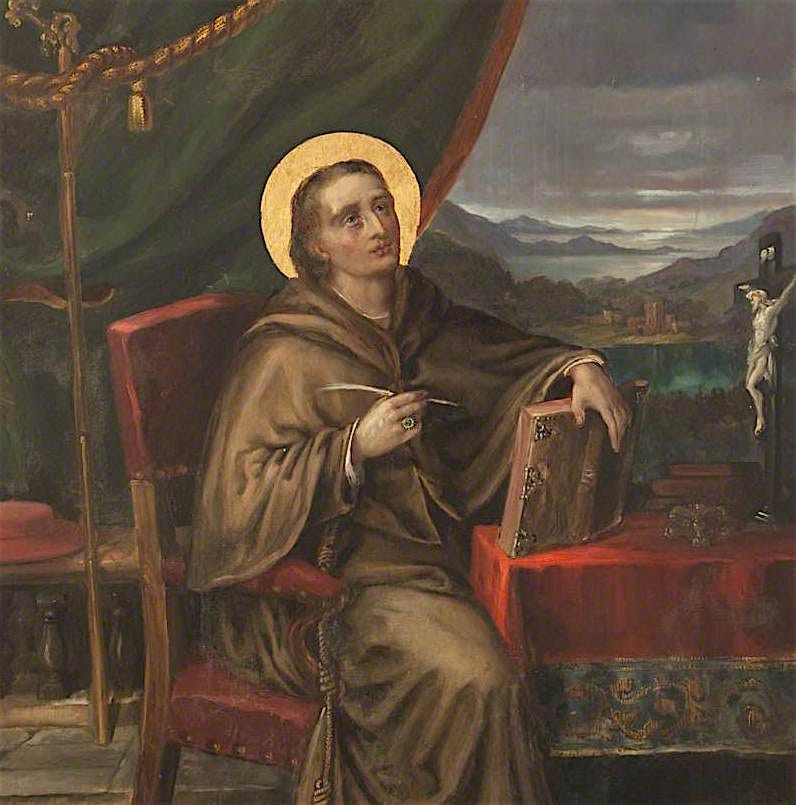“St. Bonaventure Inspired to Write”, Rebecca Dulcibella Orpen, 1890, Wikimedia Commons
Do not think that I have come to bring peace to the earth. I have not come to bring peace, but a sword. (Matt. 10:34)
Jesus Calls us to Give God First Place in Our Lives
In today’s Gospel, St. Matthew describes Jesus as He is instructing the Twelve Apostles. And as He teaches them, it becomes very clear that the call to be a disciple is no easy matter. For to leave behind everything and follow Jesus on the way of the Cross demands nothing less than a complete reordering of our priorities, as we strive to give God first place in our lives.
For as Dietrich Bonhoeffer observes, when Jesus Christ arrives He demands to stand at the very centre of our lives:
. . . Christ stands, in the centre, between me and myself, between the old existence and the new. [1]
Today’s Gospel leads us to reflect upon some of the more difficult teachings, indeed, what have been referred to as the ‘harsh sayings’ of Our Lord. These teachings serve to underscore the radical character of Our Lord’s call, and consequently point us, once again, toward the Gospel’s deeper meaning.
Ultimately, the arrival of Christ elicits a crisis in the life of the disciple. And for the earliest disciples the crisis began when they were called – not only to leave behind their livelihoods - but their families and eventually, to give up their own lives as they witnessed to the faith.
The Logic of the Sermon on the Mount
As commentators point out, all of this is entirely consistent with the logic of the Sermon on the Mount, or what has been referred to as its “logic of reversal”: such that the first will be last, the last will be first, the poor will be rich, the rich made poor, and so forth.
And it is by this logic of reversal that Jesus challenges His disciples to a higher vision of life in this world.
For within the broader context of what Jesus is saying, we are challenged to begin – now – to live in this passing world with our sights set upon the next world. Jesus calls us to strive without delay to place God at the very centre of our lives, and to give Him first place in all of our dealings.
St. Bonaventure: the “Seraphic Doctor”
Today the Church remembers St. Bonaventure, a great and holy Bishop, Cardinal, theologian, philosopher and Doctor of the Church. His holiness and ardent love for God earned him the glorious title “Seraphic Doctor,” from the word “Seraphim,” the highest choir of angels.
Born in 1221 at Civita di Bagnoregio, north of Rome, he joined the Franciscan Order as a young man, and was sent to Paris for studies. He went on to become General of his Order and came to be regarded as a second founder of the Friars Minor, for his work in consolidating the Order. He became Cardinal Bishop of Albano, near Rome, and was at the Second Council of Lyons, in France, where he died on this day in 1274.
Sources tell us that St. Bonaventure came to be regarded as unsurpassed in sanctity, wisdom and eloquence. At the same time, he was gifted with remarkable practical skills for accomplishing things with great efficiency.
A brilliant teacher and a powerful preacher, he was a holy, humble and pious man, with a winning disposition, who was always kind in his dealings with others.
His contemporaries are said to have remarked that no one was “more holy, or more learned” than he. Bonaventure wrote a Life of St. Francis of Assisi which came to be a popular book in the Middle Ages. And when St. Thomas Aquinas learned about the work, he said:
Let us allow one Saint to labor for another.
St. Bonaventure comments on the importance of learning about Christ:
If you learn everything except Christ, you learn nothing. If you learn nothing except Christ, you learn everything.
What a wonderful and timely message for us today in our postmodern, post-human era when Christ is so often neglected, ignored or rejected.
Finally, let us pray for the grace to make the sacrifices necessary to place God first, and to follow Our Lord and Saviour along the ‘narrow path’: the way of the Cross.
[1] Dietrich Bonhoeffer, Christ the Center, English translation by John Bowden, (New York: Harper & Row, 1966), p. 61.
I invite you to view the National Catholic Broadcasting Council’s Daily TV Mass below. The Homily begins at 7:04:





Thanks a million for your insightful guidance and pastoral support
Great homily about life of Saint Bonaventura.